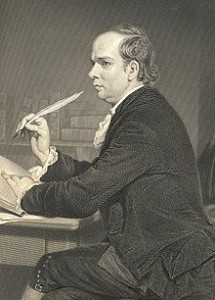 Born around 1728 in County Longford in Ireland, Oliver Goldsmith was a poet and novelist who is perhaps best known for his poem The Deserted Village that rails against the collection of wealth for wealth’s sake and the move of people away from rural areas into the cities.
Born around 1728 in County Longford in Ireland, Oliver Goldsmith was a poet and novelist who is perhaps best known for his poem The Deserted Village that rails against the collection of wealth for wealth’s sake and the move of people away from rural areas into the cities.
Goldsmith went to study in Dublin at Trinity College when he was just 16 but he was a poor student, getting himself expelled in 1747. His time at Trinity seemed to have imbued him with a taste for fashionable clothes and the hedonistic lifestyle. He tried various jobs when he left Dublin and even went to Edinburgh for a while to train to be a surgeon at the university. He finally left there, unqualified, to go on a walking trip around France and Italy.
By 1756, Goldsmith was in London, living on the edge of poverty and trying to make a living by working as a school usher. He wrote prolifically at this time but had little published though he did come to the attention of the likes of Samuel Johnson and Walpole who nicknamed him the ‘inspired idiot’.
Addicted to gambling, impetuous and highly disorganized, it seemed that Goldsmith’s life was going nowhere. In 1760 he published a series of letters and essays under the name Lien Chi which were gathered in a collection two years later and was a commentary of British social life. This was followed by a romantic ballad called The Hermit in 1765.

A year after he wrote and published the novel The Vicar of Wakefield that achieved some notoriety. It became one of the most popular works of fiction in the Victorian era and was seen as a satire on the sentimentalist novel that pervaded at the time. It is a novel that is often mentioned in other works including Dicken’s A Tale of Two Cities and Shelley’s Frankenstein.
His most famous poem is perhaps The Deserted Village, published in 1770. The work was a social commentary and drew much critical praise and denigration both in Britain and across the sea in the United States. At its heart was a condemnation of rural depopulation and the general pursuit of huge wealth without thought to happiness or the displacement of communities.

His friendship with Samuel Johnson and the painter Joshua Reynolds, led to the creation of The Club which later became The Literary Club and Goldsmith was at its forefront, often putting on lavish entertainments that he could ill afford. The group would meet at dining clubs in London and discuss the great works of the day and it would last in one form or another well into the 20th Century.
With growing debts in his later life, Goldsmith’s health began to suffer considerably and he developed a number of nervous complaints. In 1774, he found himself with a kidney infection and self-diagnosed his condition, opting to take a fever powder that may well have made the condition worse.
In April of that year he succumbed to the illness and died at the age of just 42. He was buried at the Church of St Mary in London.

